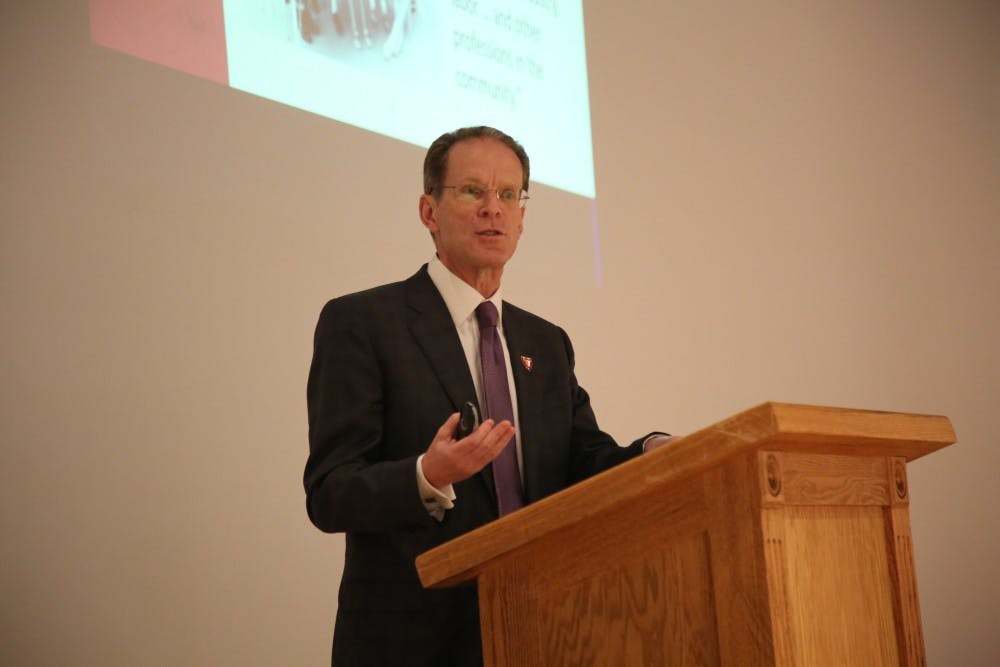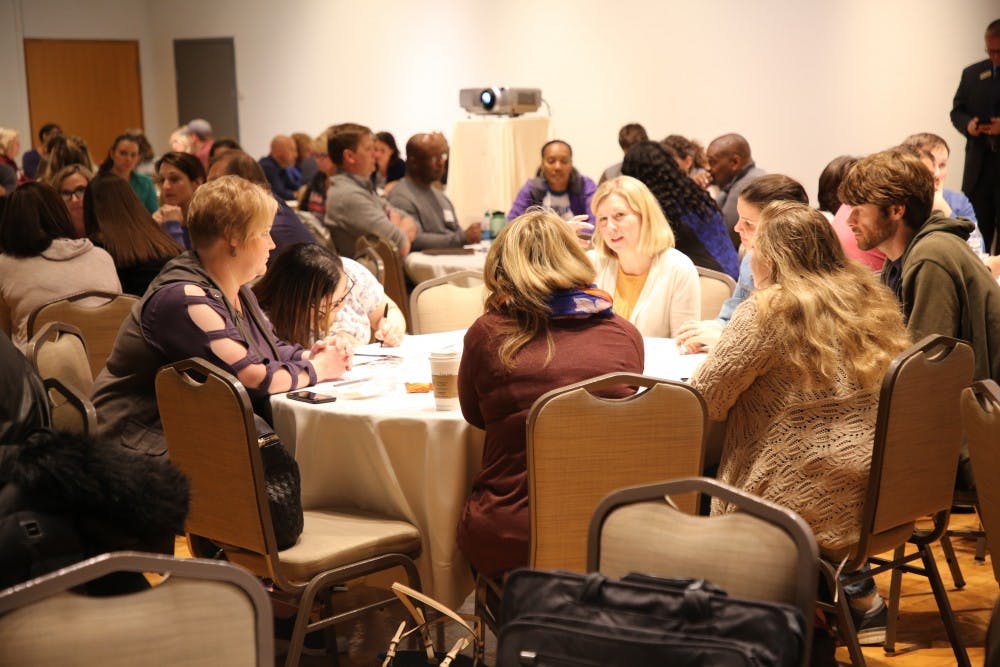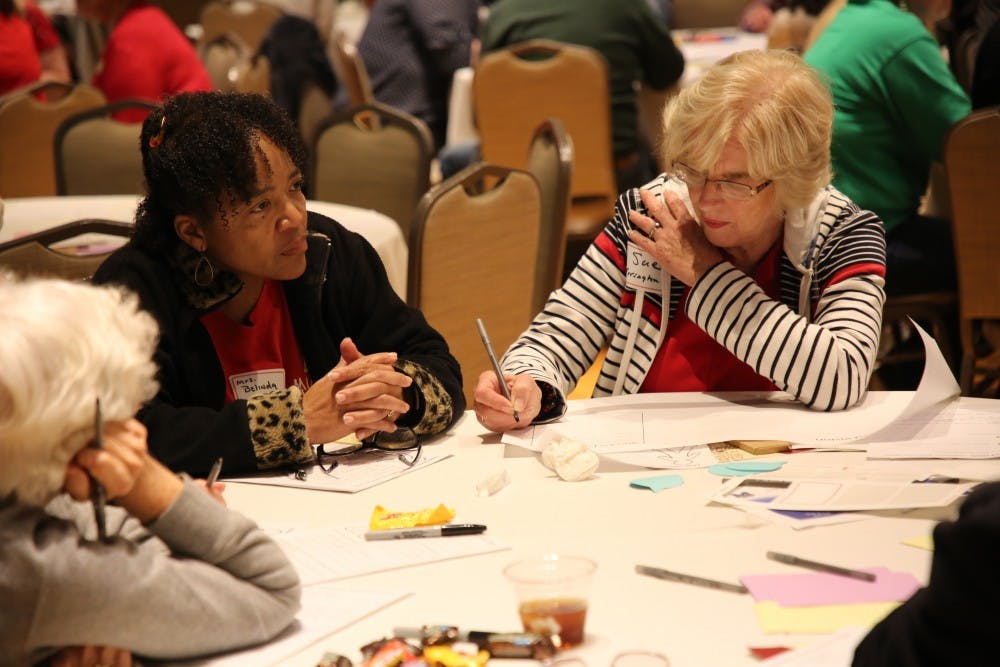Provost Susan Rivera-Mills said the timeline of the Academic Innovation Council is as follows:
Summer 2019:
Begin to imagine the innovation plan
Sept. 25-26:
Innovation Summit to integrate ideas from national and local best practices
Fall 2019:
Continue to share information with the community
January 2020:
Write and design the academic innovation plan
Spring 2020:
Final gathering to present the plan to the community and receive additional feedback
June 2020:
Present the plan to Indiana legislature
Editor's Note: This story is part of The Partnership Project, a series of content written in an effort by The Daily News to follow the formal collaboration of Ball State University and Muncie Community Schools. Read more in this series here.
Implementing mental health services; student-centered decision making that gives them an agency; eliminating standardized tests; more internship opportunities; getting the community to help aid holistic learning; more lunch options.
These were some ideas brainstormed by parents, teachers, legislators, administrators and community leaders from Ball State and the Muncie Community Schools (MCS) at the “Dreams for Our Schools” open forum Tuesday at Minnetrista.
President Geoffrey Mearns in his opening speech said the purpose of the forum was “to talk about our future — the future of our community public schools.”
The ideas, discussed in small groups and presented at the forum, were to inform the Joint Academic Innovation Council (AIC) of Ball State and MCS, to develop a the “Academic Innovation and Financial Viability Plan” to be presented to the legislature June 2020.
Mearns said while recent years have been preoccupied with challenges facing MCS, the joint partnership of Ball State an MCS inherit a “positive legacy of innovation and success for our students,” adding that they sought “innovation” and “creativity” with these challenges.

President Geoffrey Mearns speaks at the start of the "Dreams for our Schools" event May 21, 2019, at Minnetrista. Mearns said Ball State and Muncie Community Schools inherit a "positive legacy" from the schools' history. Rohith Rao, DN
For parents like Rheaunna Jones, a Ball State elementary education major whose daughter attends West View Elementary School, the biggest takeaway from the forum was “seeing the passion that everybody in the community has about … not only wanting children to succeed but teachers as well.”
“It gives everybody in the community a voice and also provides a better future academically for children and teachers,” Jones said.
Since Ball State’s partnership with MCS, she said she noticed more people who “are truly passionate” in the school system and want to give MCS students “a fair shot at quality education.”
Led by Carly Rospert, director strategic initiatives, and John Moorman, senior director organizational and community development, from Mayerson Academy, an education consulting firm, the attendees worked in groups to write their “dreams” for what the academic innovation plan should look like.
According to Susanna Rivera-Mills, Ball State provost and member of AIC’s executive leadership team, the ideas written in markers, pens and Post-It notes on large sheets of paper will be used to piece together AIC’s academic innovation plan in the summer.

Provost Susana Rivera-Mills speaks to attendees at the conclusion of the "Dreams for Our Schools" event May 21, 2019, at Minnetrista. Rivera-Mills shared with the attendees a timeline for the Joint Academic Innovation Council which is developing the academic innovation plan. Rohith Rao, DN
There will also be future opportunities this summer with focus groups and online surveys to get more feedback from the community to continue building on and improving the plan, Rivera-Mills said.
She said she continues to be “incredibly impressed, inspired by the level of engagement of our community, the level of caring that we are showing by simply being her today and dreaming and imagining the future of our schools.”
Ashley Beasley, parent of a child at East Washington Academy whose spouse also works for MCS, said after the forum, the question is how what was talked about today was actually going to inform the decisions being made and the plan itself.
“If the ideas that we come up with will be used in the future, then I think that these kinds of things can be really valuable in making sure that we are being heard and our ideas being used,” Beasley said.
Since the Ball State and MCS partnership, Beasley said she has seen “a slight improvement” in the perception that people have of the school district and “a hopeful feeling” about the future of the schools.
“I don’t think I’ve seen a lot of concrete changes, which for me is OK at this point — for Ball State to come in and kind of observe, to gather information, to find out what is working, before they start making decisions about what needs to change,” she said. “I think if they had rushed to do a lot of changes right off the bat, that probably wouldn’t have sat very well with the staff and schools.”
Jones said she would love to see more events like this one being held in the future, her only suggestion being more input from parents of MCS students.
“I know like we got to talk at the end towards the end, but I would actually like to see more parent involvement — parents getting an opportunity to speak if they want to concerning what they’d like to see for their individual child,” she said.

Attendees brainstorm ideas for the future of Muncie Community Schools as Rheaunna Jones takes notes at the "Dream for Our Schools" event May 21, 2019, at Minnetrista. The notes written will then be used to inform the academic innovation plan. Rohith Rao, DN
Contact Rohith Rao with comments at rprao@bsu.edu or on Twitter @RaoReports.





